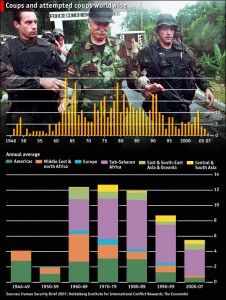A while ago, The Economist posted a Daily Chart (see below) about the frequency of coups, posing the question why are there less now then there were. I suspect they answer their own question while highlighting the limitations of too many political scientists and analysts. That is, The Economist (as well as the others I lump with it) is too concerned with the specific term (coup, here) and not with what it means. Why are coups themselves important? Usually, they are not. What is important, though, is that coups lead to regime change.
The question, therefore, should be not be why there are less coups but are there less regime changes? I suspect the answer would be no. The interesting question, therefore, is why has the method outside forces use for regime change evolved? And what does the evolution say? Given that regime change (successful or failed) now often takes place openly (e.g., Iraq, Afghanistan, Georgia, to some degree the Colored Revolutions), what does the new form mean about our international political behavior and norms?

